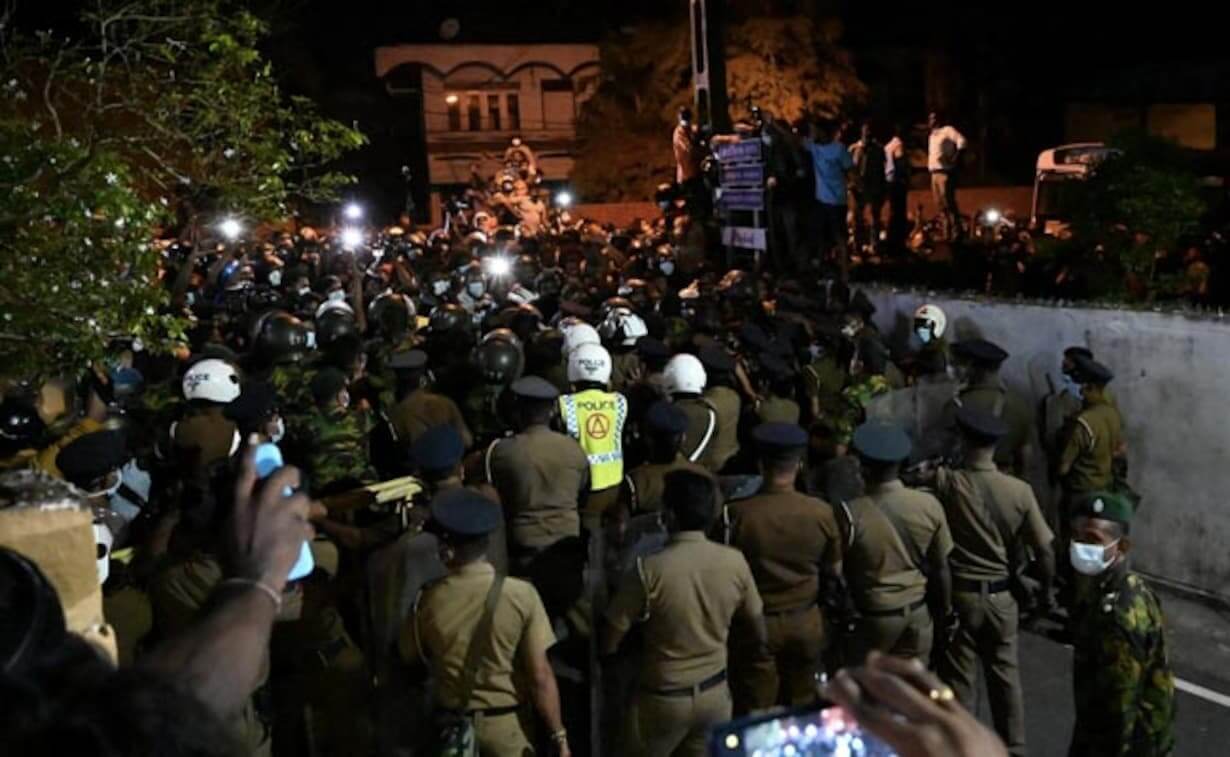Sri Lankan police imposed a curfew on early Friday after protests against the government’s handling of the ongoing financial crisis turned violent. Authorities used tear gas and water cannons to disperse hundreds of protestors who had gathered outside President Gotabaya Rajapaksa’s private residence in Colombo late on Thursday; at least 54 people were arrested while five police officers were injured.
One police bus, one police jeep, and two motorbikes were set on fire while a water cannon truck was damaged, a police spokesperson said. Reuters reported that some protesters clad in motorcycle helmets dismantled a wall, hurled bricks at police, and set fire to a bus on a road leading to Gotabaya’s residence.
Sri Lanka Economic Crisis : Protestors clash with Police near President's hosue after tear gas and water cannon used to disperse crowd https://t.co/0OHRKepZlv pic.twitter.com/wptJoxvfZk
— NewsWire 🇱🇰 (@NewsWireLK) March 31, 2022
Activists claim that the incumbent government has “ruined” the country. Citizens and opposition leaders have called for Rajapaksa’s “evil” government to resign amid an unprecedented economic crisis that has led to record-high inflation rates and severe shortages of essential commodities like food, oil, and petroleum.
The severe shortage of fuel has forced the government to halt the sale of diesel across the country, while petrol remains in short supply, severely crippling the country’s transportation system. “We are siphoning off fuel from buses that are in the garage for repairs and using that diesel to operate serviceable vehicles,” Transport Minister Dilum Amunugama said.
In addition to fuel shortages, the country has also faced blackouts. The Public Utilities Commission of Sri Lanka (PUCSL) announced yesterday that 12-hour power cuts will be imposed in several areas today due to the shortage of fuel and water needed to generate thermal and hydropower respectively. In fact, the situation is so dire that street lights have had to be turned off.
Over the past two years, Sri Lanka’s foreign reserves have dropped by around 70%, forcing it to implement import quotas that have caused shortages of essential commodities such as oil and petroleum, cooking gas, milk powder, and medicines. This has caused a severe devaluation of its currency, which has reportedly dropped by as much as 36%. Retail inflation is nearing 20% while food inflation has crossed the 30% mark.
A message from Sri Lanka to the Indian subcontinent and the rest of the world.#SriLankaEconomicCrisis pic.twitter.com/ZIkp0azC4h
— Advaid അദ്വൈത് (@Advaidism) March 25, 2022
The crisis has been partly instigated by the COVID-19 pandemic, which has dealt a major blow to the heavily tourism-reliant island nation. The government has also been accused of introducing poorly-timed tax cuts and of mismanaging finances and foreign remittances.
The country’s economic crisis has been further exacerbated by its outstanding foreign debt, of which $7 billion needs to be repaid in 2022. Reports suggest that Sri Lanka had $500 million worth of dollar bonds that matured on January 18 and an additional $1 billion bonds are slated to mature in July.
Also Read: 16 Sri Lankan Tamils Reach Indian Shores Attempting to Escape Economic Crisis
To alleviate its neighbour’s woes, India offered Sri Lanka $2.4 billion in financial assistance since January. This includes a $1 billion emergency financial support deal, a $400 million currency swap, a $500 million loan deferment, and 40,000 tonnes of diesel as part of a $500 million Line of Credit for fuel imports. In fact, it expects to receive a diesel shipment under the $500 million line of credit on Saturday.
Military tanks were seen on the roads of Colombo #SriLanka as Police curfew came into force. #lka pic.twitter.com/M9esWMPN7t
— MDWLive! SriLanka 🇱🇰 (@MDWLiveSriLanka) March 31, 2022
New Delhi has also appointed experts to assist in economic recovery. In addition, the country has also sought help from the International Monetary Fund (IMF) and will initiate discussions on a possible loan programme in the next month, a spokesperson said on Thursday.
Against this backdrop, on Thursday, the country’s main opposition party, Samagi Jana Balawegaya, held a meeting with representatives from the Chamber of Commerce, Chamber of Industry, Chamber of Construction Industry, and the Exporters’ Association to discuss the protection of critical sectors, such as the tea industry. Opposition Leader Sajith Premadasa suggested that a programme based on providing facilities for the promotion of industries and prioritising exports must be designed.

